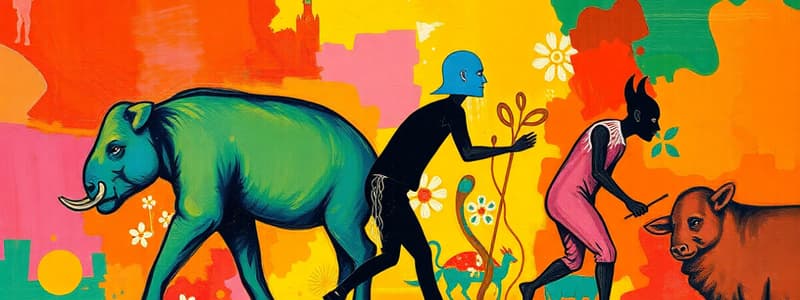Podcast
Questions and Answers
Which of the following best describes Darwin's primary research interest that led him to formulate his theories?
Which of the following best describes Darwin's primary research interest that led him to formulate his theories?
- Genetics, specifically the mechanisms of inheritance.
- Ecology, focusing on the interactions between organisms and their environment.
- Paleontology, studying fossils to understand the history of life.
- Biogeography, emphasizing the geographic distribution of species. (correct)
What was the main idea behind Darwin's hypothesis regarding the colonization of the Galapagos Islands?
What was the main idea behind Darwin's hypothesis regarding the colonization of the Galapagos Islands?
- The islands were initially populated by species independently created on each island.
- The islands were populated by species from Africa that then diversified.
- The islands were colonized by species from South America that then diversified. (correct)
- The islands served as a meeting point for species from all continents, leading to hybridization.
Which statement accurately reflects a key aspect of Darwin's theory of natural selection?
Which statement accurately reflects a key aspect of Darwin's theory of natural selection?
- Natural selection favors traits that enhance survival and reproduction in a specific environment. (correct)
- Natural selection ensures the survival and progression of a species by acting for the good of the group.
- Natural selection is a process where organisms actively try to adapt to their surroundings, directing their own evolution.
- Natural selection enables organisms to intentionally develop the traits they need to survive.
According to the principles of natural selection, which of the following is most likely to occur in a population under selective pressure?
According to the principles of natural selection, which of the following is most likely to occur in a population under selective pressure?
What distinguishes artificial selection from natural selection?
What distinguishes artificial selection from natural selection?
Which of the following scenarios best illustrates the process of natural selection?
Which of the following scenarios best illustrates the process of natural selection?
What is the direct outcome of more offspring being produced than the environment can support?
What is the direct outcome of more offspring being produced than the environment can support?
According to Darwin's observations, what are the two main premises upon which the theory of natural selection is based?
According to Darwin's observations, what are the two main premises upon which the theory of natural selection is based?
Which of the following is the most accurate definition of 'fitness' in the context of natural selection?
Which of the following is the most accurate definition of 'fitness' in the context of natural selection?
How do changing environmental conditions influence natural selection?
How do changing environmental conditions influence natural selection?
What is the relationship between adaptation and natural selection?
What is the relationship between adaptation and natural selection?
Which statement accurately describes the role of phenotypic variations in natural selection?
Which statement accurately describes the role of phenotypic variations in natural selection?
According to the modern definition of evolution, which process does Darwin's idea of 'descent with modification' align with?
According to the modern definition of evolution, which process does Darwin's idea of 'descent with modification' align with?
What is the significance of Darwin's comparison between natural selection and artificial selection?
What is the significance of Darwin's comparison between natural selection and artificial selection?
Which of the following is a consequence of traits being heritable?
Which of the following is a consequence of traits being heritable?
Which scenario exemplifies descent with modification?
Which scenario exemplifies descent with modification?
How does natural selection affect the genetic variation within a population?
How does natural selection affect the genetic variation within a population?
What role do selective pressures play in natural selection?
What role do selective pressures play in natural selection?
What is the primary difference between how traits change in a population versus how they change in an individual organism during natural selection?
What is the primary difference between how traits change in a population versus how they change in an individual organism during natural selection?
How does the domestication of plants and animals relate to artificial selection?
How does the domestication of plants and animals relate to artificial selection?
Why is the phrase 'survival of the fittest' a potentially misleading description of natural selection?
Why is the phrase 'survival of the fittest' a potentially misleading description of natural selection?
What is one reason environmental stability would reduce the effect of natural selection on a population?
What is one reason environmental stability would reduce the effect of natural selection on a population?
In a scenario where a population of insects is exposed to a new pesticide, which outcome would be the expected result of natural selection?
In a scenario where a population of insects is exposed to a new pesticide, which outcome would be the expected result of natural selection?
A population of fish lives in a lake. Over time, the lake becomes more and more polluted. Fish with gene variants that allow them to survive in polluted water become more common. What is most likely to happen to fish with those gene variants across generations?
A population of fish lives in a lake. Over time, the lake becomes more and more polluted. Fish with gene variants that allow them to survive in polluted water become more common. What is most likely to happen to fish with those gene variants across generations?
How does Darwin's finches of the Galapagos Islands exemplify adaptive radiation and natural selection?
How does Darwin's finches of the Galapagos Islands exemplify adaptive radiation and natural selection?
Flashcards
Natural selection
Natural selection
The process where individuals with certain traits survive and reproduce at higher rates due to those traits.
Evolution
Evolution
Change in the genetic makeup of a population over time; descent with modification.
Biogeography
Biogeography
The geographic distribution of species.
Darwin's hypothesis
Darwin's hypothesis
Signup and view all the flashcards
Adaptations
Adaptations
Signup and view all the flashcards
Artificial selection
Artificial selection
Signup and view all the flashcards
Fitness
Fitness
Signup and view all the flashcards
Selective Pressures
Selective Pressures
Signup and view all the flashcards
Traits are heritable
Traits are heritable
Signup and view all the flashcards
More offspring exist than can survive
More offspring exist than can survive
Signup and view all the flashcards
Study Notes
Charles Darwin
- Darwin was an English naturalist
- His most notable research occurred in the Galapagos Islands
Darwin's Research
- Darwin was interested in biogeography, the geographic distribution of species
- Darwin's hypothesis stated that organisms departed from South America and colonized the Galapagos Islands; the organisms diversified and gave rise to new species
- Darwin was specifically interested in finches
Evolution
- Evolution is the change in the genetic makeup of a population over time
- Evolution is also known as descent with modification
- Heritable traits change from generation to generation
- Darwin proposed the idea of natural selection to explain the pattern of descent with modification (evolution) that he observed
Natural Selection
- Natural selection is a process where individuals with certain traits tend to survive and reproduce at higher rates than other individuals because of those traits
- Natural selection acts on phenotypic variations in populations
- Some phenotypes will increase or decrease an organism's fitness, the ability to survive and reproduce, measured by reproductive success
- Environments can change, causing selective pressures to populations
- The theory of natural selection is based on two main observations that Darwin made: traits are heritable and more offspring are produced than can survive
- Adaptations are inherited characteristics of organisms that enhance their survival and reproduction
- Producing more offspring than can survive leads to competition for limited resources, which results in differential survival
- The traits that lead to survival, "favorable" traits, will accumulate in the population
- Populations evolve, NOT individuals
Artificial Selection
- Darwin compared natural selection to artificial selection to compel other scientists into supporting his work
- Artificial selection is the selective breeding of domesticated plants and animals to encourage the occurrence of desirable traits
Natural Selection vs Artificial Selection
- Natural selection is when nature "selects" traits that are better suited for survival and reproduction
- Artificial selection is when humans select traits that are desirable, such as in the domestication of plants and animals
- Both can lead to evolutionary change in the organism, but natural selection occurs in nature without the influence of humans
Studying That Suits You
Use AI to generate personalized quizzes and flashcards to suit your learning preferences.




